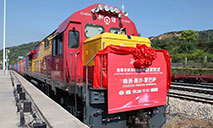Chinese new-energy vehicles gain more footing overseas with green, smart technology
OSLO, Oct. 6 (Xinhua) -- Chinese new-energy vehicles are gaining more footing in overseas markets, including Europe, where the demand for green transportation has been rapidly growing.
The popularity of Chinese electric vehicles (EVs) in other markets, which have fitted into the drive to reduce emissions, is an epitome of their competitiveness arising from efforts to develop green and smart technology.
NIO, a Chinese EV designer and manufacturer, opened a showroom in Oslo, Norway, the first of its kind in Europe, last week.
Green technology from China helps further develop the green way forward in Norway, according to Marius Hayler, CEO of NIO Norway.
NIO is among a long list of Chinese brands marketing EVs in Europe, which also includes rising start-up XPeng, iconic sedan brand Hongqi, and Build Your Dreams (BYD), a popular Chinese automaker famous for its electronic bus fleet in European countries.
In the first half of 2021, sales of new-energy vehicles of MG and Maxus, two brands of Shanghai-headquartered SAIC Motor, a major Chinese auto manufacturer, exceeded 12,000 in European countries, including Britain, Norway, the Netherlands, and Denmark.
"From the very beginning, the overseas business has been included in our development plan," said Lan Qingsong, vice president of SAIC Motor. "After 10 years of operation, our products and services have entered more than 50 countries and regions."
According to data from the Ministry of Commerce of China, new-energy vehicles have driven the growth of China's auto exports, which increased by 102.5 percent year-on-year from January to July.
"Only when Chinese auto companies enter the markets of developed countries can they truly participate in international competition," said Cui Dongshu, secretary-general of the China Passenger Car Association.
The explosive rise of China's auto exports in 2021, according to Cui, reflects the significant increase in the global competitiveness of China's auto industry, while there is still huge room for export growth.
Chinese EV manufacturers are darting into the global auto market with both latest products and new technology, including battery swapping.
With just one tap on the center display, NIO cars can be automatically parked into a battery-swap station and it takes only three minutes to swap a fully charged battery.
NIO said it aims to install 20 battery-swap stations in Norway's five largest cities and on some of the country's major roads.
Zhang Hui, vice president of NIO Europe, said that the company contributes to sustainable development in China and Europe through a unique technological base, adding that smart and digital experience advantages and cloud-based upgraded hardware features are NIO's technical advantages.
A number of Chinese technology giants have recently jumped into the EV market, bringing more competition and innovation to the auto industry.
Xiaomi, a Chinese electronics manufacturer, unveiled in September an EV subsidiary, with a starting capital of 10 billion yuan (about 1.5 billion U.S. dollars). The Guangzhou-based GAC Group announced earlier this year a joint project with Chinese tech giant Huawei to develop a "smart SUV."
Artificial intelligence (AI) has been a major feature of many Chinese EVs. With tech companies entering the track, competition surrounding AI is expected to be more intense.
Photos
Related Stories
Copyright © 2021 People's Daily Online. All Rights Reserved.










